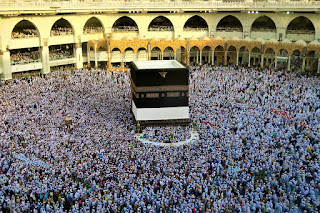
Honorable Muslims!
One of the Companions came to our Prophet (saw) and said, "O the Messenger of Allah! Tell me something of Islam which I will not ask anyone else." The Messenger of Allah (saw) said, قُلْ آمَنْتُ بِاللّٰهِ ثُمَّ اسْتَقِمْ "Say, 'I believe in Allah' and then be steadfast".[1]
Dear Believers!
The goal of our sublime religion, Islam, is to build an ideal society of virtuous people. It is to build a world where all creation can live in safety and peace. Allah the Almighty (swt) has blessed us with reason and will for this purpose. It is for this reason that He (swt) has sent the divine books which are guides and the Prophets who are the representatives of the right and the truth. Moreover, our Lord Almighty (swt) has also provided us with guidance to follow steadfastly the true path. This involves duly believing in our Lord (swt) and leading a life on the straight path.
Dear Believers!
Iman means being a sincere servant to our Lord (swt). It means living a life in the footsteps of the Prophet (saw). Iman liberates people. It guides them to the rightest path, the Sirat al-Mustaqim. Iman teaches people the purpose of their creation and their responsibilities. It gives them a sense of identity and character.
Iman requires istiqamah, i.e. to match one's word with one's deed. It is to appear as one is or to be as one appears. Istiqamah means living according to the Holy Qur'an and the Sunnah of our Prophet (saw). It is the placing of the pleasure of Allah (swt) and His Messenger (saw) above anything or anyone else.
Dear Muslims!
Istiqamah acquires its true meaning as long as it is reflected in our faith, our worship, our morals, in every moment and in every aspect of our lives.
Istiqamah in faith means not attributing any partners to Allah (swt). It is to embrace tawhid and wahdat. It is to be sincerely committed to the verse, فَاسْتَقِمْ كَمَٓا اُمِرْتَ "So be steadfast as you are commanded."[2]
Istiqamah in worship is the perseverance in our duties of servitude to Allah (swt) until death comes to us. Istiqamah in worship is to worship Allah (swt) alone and to purify our worship from all kinds of pretense and ostentation.
Dear Muslims!
Istiqamah in morals is to adopt the exemplary morality of the Prophet (saw), who says, إِنَّمَا بُعِثْتُ لِأُتَمِّمَ صَالِحَ الْأَخْلَاقِ "I was sent to perfect good character."[3] Istiqamah in morality is to let love and affection, kindness and courtesy dominate our family life. It is to never resort to lies and deceit, oppression and injustice. It is to avoid behavior that violates the rights of the people and the public. It is to keep everything that is haram and sinful away from our hands, our tongue, our home, our work, in other words, from every aspect of our lives.
Dear Believers!
We have learned istiqamah in faith, sincerity in worship, and honesty in morals from our Prophet Muhammad Mustafa (saw). From him (saw) we have learned love and respect, reverence and affection, the culture of living together as brothers and sisters. It is he (saw) who taught us to obey our parents, to be faithful to our spouses, to treat our children with mercy, and to respect the rights of our neighbors. From him all humanity have learned that superiority in the sight of Allah (swt) lies only in piety, and that people are equal as teeth in a comb.
Blessed are those who live a life in the direction our Lord (swt) has commanded and our Prophet (saw) has taught by his example. Blessed are those who are free from evil feelings and thoughts such as hatred, enmity, hostility and envy, which are obstacles to the right path.
I would like to conclude this Friday's khutbah with the following verse, in which our Lord (swt) gives glad tidings to the believers who attain istiqamah: "Surely those who say, "Our Lord is Allah," and then remain steadfast—there will be no fear for them, nor will they grieve."[4]
________________________________
[1] Ibn Hanbal, III, 413.
[2] Hud, 11/112.
[3] Ibn Hanbal, II, 381.
[4] Ahqaf, 46/13.
General Directorate of Religious Services
